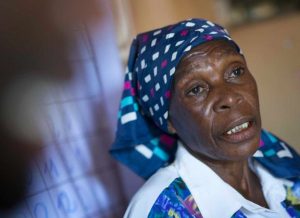. . WOMEN’S EQUALITY . .
An article from Oxfam
In Mozambique, still building respect for women’s rights and working to end violence against them.
Aida Changuane needed help: She was constantly quarreling with her son and daughter in law. Since her husband passed away a few years ago, it seemed the younger generation in her household was disrespecting her, at times depriving her of food, and she says she was constantly criticizing them. They thought she was interfering in their relationship. They fought a lot.

Aida Changuane, 56, led her family to find ways to resolve conflict and live a happier life together. Photo by Brett Eloff/Oxfam America.
“I was suffering,” she told me, standing outside a community office for the ruling FRELIMO political party in her town, Boane, about an hour from Mozambique’s capital Maputo. “I was sorry my husband passed away, I cried day and night.”
Changuane learned about an organization called Nweti (it means “moon” in the local language, signifying a hopeful light in the night). She attended special community dialogue meetings with Nweti’s trained activists who helped her find ways of provoking dialogue instead of confrontation. “I learned the life we were living was not proper, it was too violent, and they taught me how to handle things…I learned there should be dialogue…when there are problems I now ask them to sit down and discuss them.”
She stressed over and over again that her family is now living peacefully, and that she is much happier, despite her sadness in the loss of her husband.
I never got the impression that the conflict in Changuane’s home ever became physically violent, but that was not the case for 34 year old Virginia Machuene, who lives nearby in a smaller town called Massaca, an hour and a half by car from the capitol Maputo on the road west to Swaziland and South Africa, only about 15 kilometers from the border.
(article continued in right column)
Protecting women and girls against violence, Is progress being made?
(article continued from left column)
Machuene says she and her husband fought about a lot of things, and he was frequently physically violent. She also attended the community dialogue meetings and learned how to defuse these violent encounters, and brought her husband materials to read that got him to change his behavior.
“I realized violent confrontation is not good,” she says, with a firm look on her face. “Now I am feeling like I am leading a better life than before.”
What’s really changing?
I just went to Mozambique to look at the ways Oxfam has been working on decreasing domestic and gender-based violence. We’ve funded organizations like Nweti for years, and helped others to research and push for new laws designed to bring better respect to women’s rights and decrease violence.
We (Oxfam and all our partners) have been on this road for more than 20 years, but getting people to respect new laws, and encouraging the police and judges to enforce them, is not easy.
The stories of two women like Changuane and Machuene cannot imply a trend in a huge country like Mozambique, but they give me hope anyway. I’m going to keep looking at the question of what is changing here, what we can do to support this work.
As I go, I’ll try to remember the words of Virginia Machuene:
“What the activists [at Nweti] teach us is that in cases of violence, we should report it to community leaders. They teach us that women should not keep quiet when they suffer violence.”
“Nowadays people are changing…I can’t say why. Maybe it’s the church, the activists working with us here, or maybe the laws are changing, or because we have brochures that people can read and people can change. But not so many people are going through this kind of violence.”
(Thank you to Janet Hudgins, the CPNN reporter for this article)